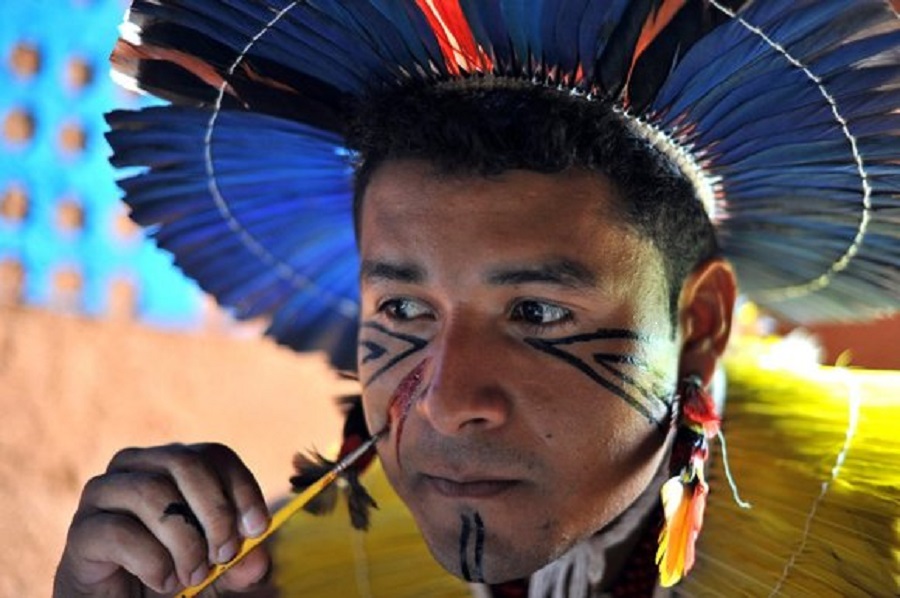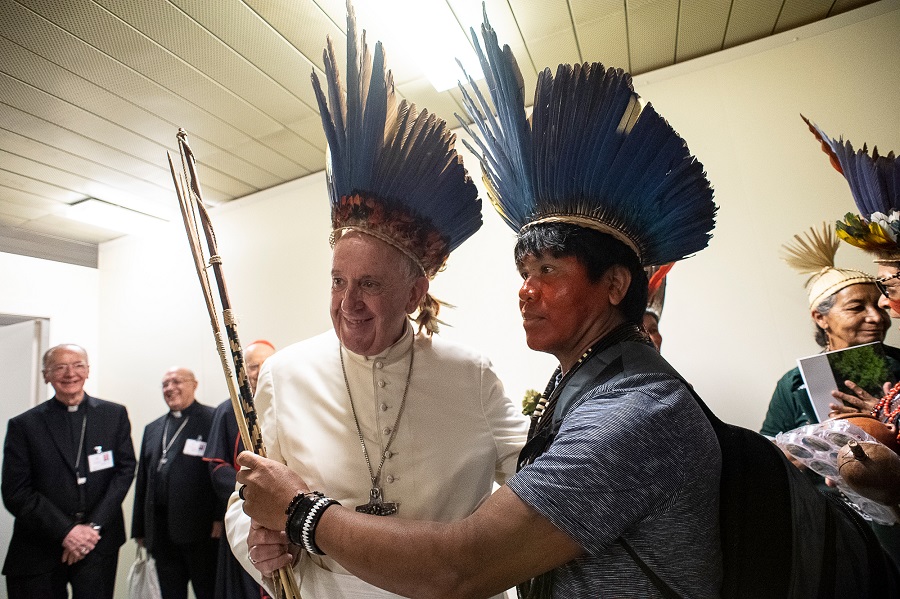RIO DE JANEIRO, BRAZIL – The Arassari Pataxó Indian defines himself as “a warrior who fights for respect for the rights of indigenous peoples in Brazil”. He was in Rome to give lectures in universities, schools and cultural centers about the issues that Brazilian Indians suffer, mainly in what concerns the demarcation of lands.

The representative of the Pataxó ethnic group from South Bahia, where he was born, tells that for some time his people have been fighting for the protection of their territories, the target of attacks and invasions due to their many riches, mainly wood and minerals.
According to Arassari, many land demarcation procedures are blocked. He is studying Criminal Law at Estácio de Sá University in Rio de Janeiro to help in the claims of indigenous peoples. “We, the indigenous people have come together to defend our rights and to demand the total demarcation of our lands.
At all the conferences he attended in the Italian capital – organized by the Alberos Cultural Association – he presented himself with his colorful feather boa and explained the ancient traditions of his people.
“I came to Rome to bring the voice of the forest peoples. Because we, the indigenous peoples, have the mission to preserve and reside within the forests. Before it was called Brazil, it was Pindorama Land. It belonged to all peoples. It was a paradise”.
“My struggle is precisely to help save that paradise, which today is condemned to destruction by the greed of man. In Brazil, our voice is being taken away. So I come to call on the world to respect our rights and that the Brazilian authorities can demarcate our territory and let us live in peace,” says Arassari.
Degradation
Although indigenous peoples have been suffering for many years, according to Arassari, the situation has worsened with the government of Jair Bolsonaro.
The Brazilian president’s statements against the demarcation of indigenous lands began before the 2018 election campaign and continued after he became president.
After taking office, Bolsonaro issued a provisional measure to reorganize ministries and abolish some portfolios. Under the measure, the FUNAI (National Indian Foundation) would be detached from the Ministry of Justice and Public Safety and would fall under the Ministry of Women, Family and Human Rights, headed by Damares Alves.
FUNAI would also lose the function of demarcating indigenous lands, which would fall on the Ministry of Agriculture.
However, Congress rejected these changes. In the final provisional measure text, passed in late May, the FUNAI remained under the Ministry of Justice, responsible for the studies that serve as the basis for the demarcations.
Greed
Arassari criticizes Bolsonaro’s government management on environmental preservation. According to him, greed prevails.
“The situation has gotten a lot worse because this presidential administration has said that, in order for Brazil to grow economically, it has to use indigenous soil, it has to sell the gold, destroy, sell the timber”.
“That is their mistake. They are wrong because the greatest wealth is environmental preservation, generating life for all humankind, for climate balance”.
“It’s disconcerting when he says he’ll use the Amazon to enrich the country. About 50 percent of the indigenous population is there, inside the Amazon. The Indians are responsible for protecting the territory. When we look at Brazil, we see that all Indian lands have drinking water, they have fertile soil. They are greedy,” he says.

Relation with NGOs
Recently, Jair Bolsonaro accused Non-Governmental Organizations of setting fire to the Amazon and held actor Leonardo DiCaprio responsible for financing them.
Arassari refuted the president’s statements.
“It is the indigenous peoples who speak for the indigenous peoples. It is in the federal constitution, in articles 231 and 232, that the indigenous peoples must be respected for their forms of social organization. No institution can speak for indigenous peoples. So far, no NGO has harmed nature, has interfered in the decisions of the indigenous peoples”.
“He is using this to take our land and hand it over to the big companies, in the hands of the ruralists”, he accuses.
“NGOs have done a great job of preservation, of bringing autonomy to a nation that had no voice. In certain cases, we have to travel five days by boat to reach a village. And how do we get a doctor there? Sometimes even paid doctors don’t want to go to the village. We have some volunteers who come to the village because they love the cause”.
“The government does not support this kind of initiative. The reason they keep talking about all this is because they want the indigenous people to die without care”.
The Synod for the Amazon
Last October, the Vatican held the Synod for the Amazon, an unprecedented initiative by the Catholic Church. According to Arassari, Pope Francis started a dialogue with the world by bringing up the indigenous issue through this Synod.
He said the indigenous people are worried about “the reduction of forests, the burning, the fauna and the destruction of the soil, but mainly because in the Amazon, the majority of indigenous peoples are at risk of extinction”.
“I believe, as do my people, that this meeting with the Pope was an opening for the world to learn about our reality, which until then had not been told. The Pope brought this opportunity for humankind to realize that the indigenous issue concerns the world”.
Relationship with Evangelical Churches
“It’s very worrying because evangelicals say that our culture is from hell, that we have to ensure a place in heaven. Our old men, who are our great leaders, say that we cannot accept this kind of dominant religion because it goes against our understanding. Because our religion is indigenous, we do not need this kind of religious interference”.
“A nation must also be different, and other cultures must respect the indigenous ways. I do not accept religion in my village. We are constantly fighting against it,” he says.

Indigenous ethnicities in Brazil
Arassari says that in Brazil there are 380 indigenous ethnic groups that speak 184 languages.
“Today there are five types of indigenous people in Brazil. The isolated ones, who never had contact with other cultures or civilizations. The semi-isolated, who have already had contact with the National Indian Foundation, or with another ethnic group”.
“We also have the village Indian, the one who lives in the village and, despite having contacts with other peoples, does not want to leave the village.”
“In addition, we have the Indian in an urban context, who is the one who fled from the village because of war or left to study and is residing in the city. Finally, we have the Indian who is in a system of identity recognition. He’s the one who was born in the city because his father fled the village and wants to return to the original tribe”, he explains.
The Pataxó people
The Pataxó are the ninth most populous people in Brazil, with 23,000 individuals living in 18 villages. Today they are located in three Brazilian states. In Bahia, in Porto Seguro, Cabrália and Prado; in Minas Gerais, in the city of Carmésia; and also in Rio de Janeiro, in Paraty.
They were the first to get in touch with the Europeans because they were located in Mount Pascoal, so named because the Portuguese arrived at Easter.
“Pataxó means the sound of water trickling on a rock. We are agraphic peoples, we don’t use writing. Our transmission and propagation of knowledge is oral. Our old people become living archives to teach us. All our information is passed on to us as we sit by the fire with an old man and he teaches us everything about life”.
“In other cultures, mainly European, the smartest person is the one with a diploma, who speaks several languages. For our people the smartest person is the one who has lived the longest, the old man, that’s why he is sacred to us,” he adds.
Source: Carta Capital

